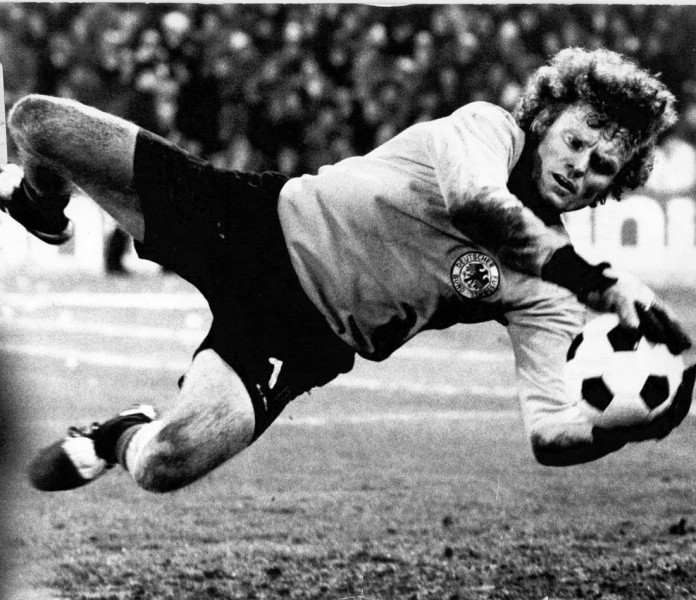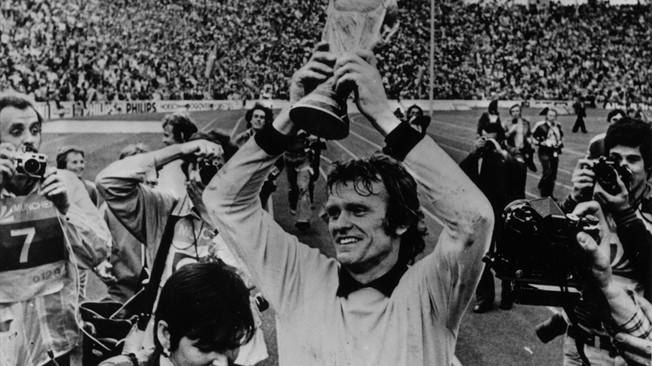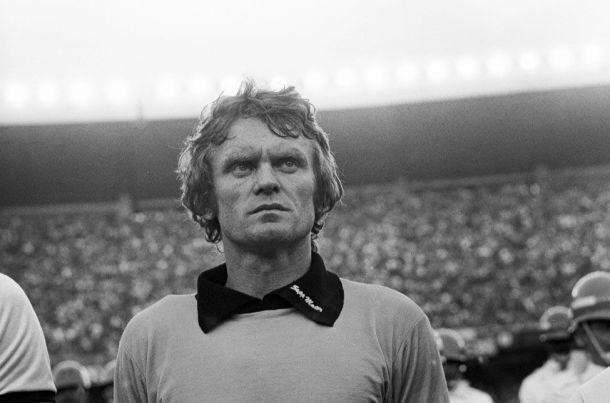This summer signals the start of the 20th FIFA World Cup in Brazil. Unsurprisingly, the fans of the beautiful sport of football have been treated to so much brilliance since the competition began in Uruguay in 1930, admiring Hungary's dominance as the "Golden Team" of the 1950's, West Germany's phenomenal side during the 70's or modern day teams like Spain, only the third side to achieve the feat of obtaining the title of World Cup and European Championship holders at the same time. To mark what will be a very special tournament, I have decided to write a number of articles on players who are widely regarded as international legends. I begin with former Germany and Bayern Munich goalkeeper Sepp Maier.
Born on the 28 February 1944, Maier began with TSV Haar, a team located near Munich, he certainly knew how to delight the public- not just on a football pitch! He used to crawl under the tables at post-match banquets to tie his team-mates’ shoe laces together to “demonstrate the common bond in the squad”. Beginning as a striker, his coach Rudi Weiss had the opinion he would be more useful between the sticks. The big German himself said it was a case of "you're the laziest, you're the fattest, you go in goal".
Here's an extract from Bayern Munich's official site in a exclusive interview with Maier for his 70th birthday.
"He started his epic career as a right winger at TSV Haar where he even ended up as top goalscorer. His coach back then put him in goal as a stop gap. His team lost 12-0 - Maier impressed despite the result.
Maier was left speechless when the coach put him in goal again. “Mr Weiss, I’m a striker and not a keeper. I haven’t even got goalie’s kit with me,” recalled Maier. Fortunately, that did not prevent his appearance between the sticks. “We won 3-1 and I saved two penalties - and I never repeated that feat again.”
Reflecting upon cherished childhood memories, Maier spoke fondly about the round ball he (usually) stopped from beating him in goal. "
"I didn't go to bed with a teddy bear - I had a ball alongside me. What a relationship we had – I loved that ball! I can remember it all: it was just after Christmas, I was seven years old and I had a football.
"You were the king of the world back then if you had one. The lad with the ball got to pick the teams. ‘You're a creep, you were nasty to me! You're too fat, you go in goal!' If you had a ball, you were the boss."
Maier signed his first professional contract with FC Bayern, who he had been with for three years at that stage after seven years' development at TSV Haar. After a few appearances in and out of the first team, Maier replaced an out of form Fritz Kosar in goals in the 1963/64' season, though Kosar did retain his place in the starting XI by playing as an inside forward due to injuries! He was part of Bayern's all conquering 1970's side containing greats Franz Beckenbauer and Gerd Müller, and winning the European Cup three times in a row, a German record. He also won four Bundesliga titles during his time with the club, was voted German player of the year three times, before finding himself in the XI for Bayern's strongest side of the past century, alongside team mates Beckenbauer and Müller. He set a record by playing 442 Bundesliga games on the trot between 1966 and 1979, and only missed three games in total, the 10th, 11th and 34th games of the 1965/66' season.
In the voting for the best goalkeeper of the best century, he finished fourth behind Lev Yashin, Gordon Banks and Dino Zoff. “I’m proud to have belonged to the generation that laid the foundations for what Bayern are today: a top club on the domestic and international stage,” said Maier.
Nicknamed "Die Katze von Anzing" - The cat from Anzing, due to his amazing agility, he won his first of ninety-six international appearances in a 4-0 win over Ireland in the spring of 1966 before making the plane to the World Cup in the same summer as back up to 'keeper Hans Tilkowski, as the Germans lost 4-2 to their English friends in the final. When the Weltmeisterschaft (as it's called in Germany) came calling four years later, Maier was entering what would be a golden few years on the club scene with Munich and got his first real taste of a competitive tournament on the international side with Germany in Mexico. Having won the number one jersey, he and his fellow Germans breezed through their group with victories over Morocco, Bulgaria, and Peru. Maier and his team mates then had a replay of the 1966 final, playing England again in the quarter-finals. After falling behind by two goals either side of half time a famous comeback advanced the Germans into a massive semi-final with Italy, Franz Beckenbauer, Uwe Seller and of course Gerd Müller with the winner in extra time to claim revenge on Alf Ramsey's side.
Dubbed "Game of the century" West Germany lost 4-3 in extra time to Feruccio Valcareggi's side, after 5 goals in a frantic period of extra time meaning Maier's first real taste of World Cup action did not end with the trophy, despite winning the third place play off against Uruguay, in which he did not play.

“There’s no need to make a daring leap if you’re standing in the right place to begin with.”
Success in 74'
The 70's really were a special time for Bayern Munich, Germany, and of course Sepp Maier. The German coach Helmut Schön began to assemble a squad of players that is widely regarded to be among one of the best sides ever to grace the competition. FC Bayern and Borussia Mönchengladbach players were widely selected, including the likes of Beckenbauer, Müller, Uli Hoeness and Günter Netzer, among those chosen to command the pitch, with the safeguard of the best German national goalkeeper of the century behind the defence. A strong European Championship a couple of years before the big event was capped off by a tantalising domination of the Soviet Union in a 3-0 triumph in the final. This would prove to be Maier's only European trophy win as his national team fell just short in their defence of the title in 1976, finishing runners up in Yugoslavia, losing to Czechoslovakia in the final.
The 1974 World Cup held in Germany ended the German Nationalmannschaft's (20 years, as a nation, being the last World Cup win before '74) long wait for the newly commissioned trophy, after Brazil were allowed to keep the Jules Rimet trophy due to the rule Fifa made when it all began in 1930 that the first side to win the trophy three times would be given the great honour of keeping it permanently. It wasn't the smoothest of rides for Sepp and his team to begin with, a shock loss to East Germany, and very narrow wins over Chile and Australia seeing them through to the quarter-finals. Schön's team overcome Sweden 4-2 before narrowly escaping with a 0-1 victory against a very talented Polish side who featured the tournament's top scorer Grzegorz Lato (with 7 goals). They were to face one of the other fantastic sides of the 70's in the Netherlands in one of the most anticipated World Cup finals, two world player of the year nominees in Franz Beckenbauer and Johan Cruyff facing each other off as captains. Just so you know what type of team Bayern's ambidextrous goalkeeper had to face, the 70's was a time when 'Totaalvoetbal' was created, led by Messers Cruyff and national team coach Rinus Michels. Michels and his players had qualified for their first World Cup since 1938- That's an incredible 36 years, or 9 World Cups missed out on, and had returned to the biggest international platform in exquisite style- they had breezed through the group stage and had put the East Germans, Argentina, and the holders Brazil to the sword with Johan Neeskens and Cruyff at their breathtaking best. "The only team I’ve seen that did things differently was Holland at 74' World Cup in Germany. Since then everything looks more or less the same to me…. Their ‘carousel’ style of play was amazing to look and marvellous for the game", said Carlos Alberto, captain of the Brazil team who had won in 1970. No pressure for Maier then.
The start of the match was delayed as after the corner flags were removed for the closing ceremony which preceded the match, they were bizarrely forgotten to be put back in it's place! After that intense drama, more would follow soon after, Johan Cruyff darting into the German box with only a minute played, and Maier would have a penalty to try to save as Uli Hoeness brought the legendary forward down, and Neskeens promptly converted the resulting spot kick. A Paul Breitner penalty halfway through the first half and a famous Gerd Müller goal a couple of minutes before half time (famous as this was Müller's last ever international goal) won West Germany's 2nd World Cup, not before Maier made save after countless save from Cruyff and co to help win the trophy. "Without Sepp we would never have won the World Cup," the winning captain Franz Beckenbauer speaking highly of his adored team-mate. "Maier saved marvelously, at least half a dozen of unsavable ones!” said Schön.

Maier with the World Cup.
For Maier, it may have felt like a consolidation to his poor performance against Ajax in Amsterdam in the 1973 Champions League quarter final, where he had let in four goals. For the player himself, he described it as the worst performance of his entire career, going as far as to burning the gloves he wore on the night.
West Germany reached the final of the 1976 European Championship, beaten on penalties by Czechoslovakia 5-3, after attacking midfielder Antonín Panenka tried an audacious chip down the middle of the goals, beating an astounded Maier and winning the Championship. Pele famously said "either a genius or a madman" would attempt such a risky penalty. After that incident, that style of penalty as you probably have realised is named after Antonín Panenka.
Having lost the likes of Beckenbauer, Müller and Hoeness from the team and Paul Breitner refusing to play due to the political situation in Argentina at the time, where it was held, made Maier the oldest player in the 78' World Cup squad at 34, and was understandably unable to stop the Germans going home in the second round.
He originally intended to continue playing until he was 40 but a tragic car accident in 1979 resulted in a torn diaphragm, suffered concussion, a broken arm and fractured ribs, bringing an end to the career of such an inspiring and unique character in football. His friend Uli Hoeness was his saviour, having the presence of mind to move him to another hospital for emergency surgery. "Another couple of hours and it would have been curtains for me. I wouldn’t be here now. I’d have been six feet under for the last 35 years,” explained Maier.
"I always used to say that I'd carry on playing for as long as Franz Beckenbauer and Gerd Muller can push me on to the pitch in a wheelchair"
So, what did Sepp do with his time after his playing career abruptly ended? Originally he built a big tennis centre as the sport had been one of his loves before his time with Bayern began, but when Franz Beckenbauer came calling after becoming Germany boss for Maier to become a goalkeeping coach, he couldn't decline, and stayed with the national team from 1987 until 2004, when in the debate whether Oliver Kahn or Jens Lehmann should start, Maier publically backed Kahn and was soon fired by then manager Jurgen Klinsmann, but stayed on for the same position at Bayern Munich until he left in 2008, having been there for his second spell since 1994. Whilst there, Uli Hoeness came to Sepp and told him he had bought a precious stone from Karlsruhe, and told his dear friend to turn him into a diamond. Maier and Kahn formed an inseparable partnership right up until 2008, when Kahn retired and Maier left the club. The two of them occasionally meet up on the golf course these days - Maier’s favourite activity alongside hiking (“You have peace and quiet and you get the chance to see how beautiful the world is"). He still keeps an eye on his Bayern, though. "A very close eye. That's my team".
Sepp always kept Kahn on his toes!
In tribute of his fantastic performances for Bayern and Germany, he was the first player to be given the honour of a testimonial match pitting club versus country, his Munich side taking on a select German XI, and Oliver Kahn has been the only player to be granted that some privilege since.
One of my favourite stories regarding Sepp Maier was one which highlighted his strength as a person as well as a player and his vibrant character shone through. Gyula Lorant had just been sacked after displeasing many of the Bayern players, and controversial club president Franz Neudecker wanted to install Max Merkel as the new boss. The squad were outraged with Merkel a former manager of arch-rivals 1860 Munich, and Maier led a player revolution against the president to remove him from the club and have Wili Hoffmann as Neudecker's replacement. The players succeeded, but the German FA were absolutely outraged with Bayern's ring leader and decided to ban him, though fan pressure resulted in the "prodigal son's return" (in the FA's eyes)
in the spring of 79', shortly before the horrific accident. Not to forget an crazy incident in a Bundesliga game against Bochum. His opponents had yet to register a shot on goal, so as a duck made it's way onto the pitch Maier decided to chase after it, citing boredom as his reason!
How would one of the world's best goalkeeper's prepare himself for a match the night before? Have a well balanced meal before heading to bed at a reasonable time and rest up for the big game? Not for Maier and his team-mates! " The night before a game we used to eat roast pork, and wash it down with wheat beer," he recalled, "That gorilla Bulle Roth always used to eat three pieces of cake before a game-and it never did him any harm!"
Finally, I would like to leave you with this astonishing statistic: Of the 13 big finals played with Bayern Munich and Germany (All of the following being those finals: 1 World Cup, 2 European Championships, 4 European Cups, 4 German Cups, and 2 Intercontinental Cups), he only lost a single one, the penalty shoot out to Czechoslovakia in 76'. Thank you for what you have brought to the world of football, Sepp Maier.










































